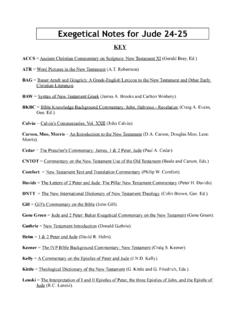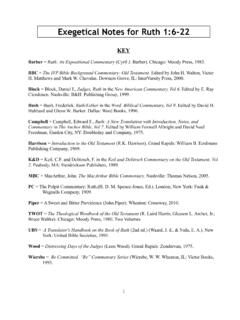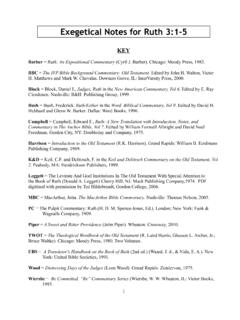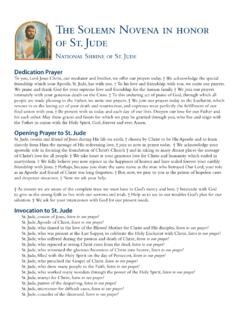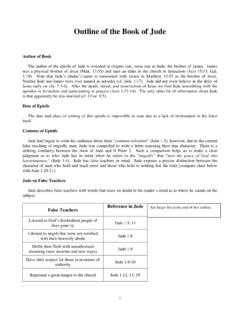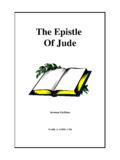Transcription of Exegetical Notes for Jude 17-23 - Tony A. Bartolucci
1 KEYACCS = Ancient Christian Commentary on Scripture: New Testament XI (Gerald Bray, Ed.)ATR = Word Pictures in the New Testament ( Robertson).BAG = Bauer Arndt and Gingrich: A Greek-English Lexicon to the New Testament and Other Early Christian Literature. BAW = Syntax of New Testament Greek (James A. Brooks and Carlton Winbery).BKBC = Bible Knowledge Background Commentary: John, Hebrews - Revelation (Craig A. Evans, Gen. Ed.).Calvin = Calvin's Commentaries, Vol. XXII (John Calvin).Carson, Moo, Morris = An Introduction to the New Testament ( Carson, Douglas Moo, Leon Morris).Cedar = The Preacher's Commentary: James, 1 & 2 Peter, jude (Paul A. Cedar). CNTOT = Commentary on the New Testament Use of the Old Testament (Beale and Carson, Eds.)
2 Comfort = New Testament Text and Translation Commentary (Philip W. Comfort).Davids = The Letters of 2 Peter and jude : The Pillar New Testament Commentary (Peter H. Davids). DNTT = The New International Dictionary of New Testament Theology (Colin Brown, Gen. Ed.).Gill = Gill's Commentary on the Bible (John Gill). Gene Green = jude and 2 Peter: Baker Exegetical Commentary on the New Testament (Gene Green).Guthrie = New Testament Introduction (Donald Guthrie). Helm = 1 & 2 Peter and jude (David R. Helm).Keener = The IVP Bible Background Commentary: New Testament (Craig S. Keener). Kelly = A Commentary on the Epistles of Peter and jude ( Kelly). Kittle = Theological Dictionary of the New Testament (G. Kittle and G. Friedrich, Eds.)
3 Lenski = The Interpretation of I and II Epistles of Peter, the three Epistles of John, and the Epistle of jude ( Lenski). Exegetical Notes for jude 17-23 Luther = Commentary on Peter and jude (Martin Luther). Metzger = A Textual Commentary on the Greek New Testament (Bruce M. Metzger).Michael Green = Tyndale New Testament Commentaries: 2 Peter and jude (Michael Green).NLK = New Linguistic and Exegetical Key to the Greek New Schreiner = The New American Commentary: 1, 2 Peter, jude (Thomas R. Schreiner).Wallace = Greek Grammar Beyond the Basics (Daniel B. Wallace).Parsing Verbs and Declining NounsVerbs (tense, voice, mood, person, number): (poimainw = to tend, shepherd || Verb: Aorist Active Imperative, 2P). (w = to reveal, disclose || Verb: Present Passive Infinitive).
4 Nouns (gender, case, number): , ( = suffering || Noun: Neuter Genitive Plural).Participles (gender, case, number, tense, voice): (mellw = to be about to || Participle: Feminine Genitive Singular Present Active).Adjectives (gender, case, number): (ejpieikh" = gentle, kind || Adjective: Masculine Dative Plural).Pronouns (person, case, number):' (ejgw = I || First Person Independent Personal Pronoun: Dative Plural). (su = you || Second Person Independent Personal Pronoun: Dative Plural).aujtw/' (aujto" = He, Him || Third Person Independent Personal Pronoun: Masculine Dative Singular).(touto = this || Near Demonstrative Pronoun: Neuter Nominative Singular). Passage StructureSentence17 , , you but beloved must remember the words Relative Clause spoken beforehand Prepositional Phrase by the apostles of Lord our Appositional Clause Jesus Christ Subordinate Clause18 that they were saying to you, Prepositional Phrase In the last time Quotative Frame there will be mockers Prepositional Phrase according to - their own desires Appositional Clause.
5 Pursuing ungodly Sentence19 , These are the ones who cause divisions Appositional Clause , . worldly, without the Segment Clause20 , , you but beloved Participial Clause building yourselves up on most holy your faith Prepositional Phrase in Spirit Holy Segment Clause , praying Segment Clause21 yourselves Prepositional Phrase in the love of God keep Participial Clause while waiting for the mercy of Lord our Appositional Clause Jesus Christ Prepositional Phrase.
6 To life eternalSentence Segment Clause22 And Relative Clause those who have mercy on , are doubting; Segment Clause23 others but save Prepositional Phrase out of the fire Participial Clause , by snatching them Segment Clause others and have mercy on Prepositional Phrase with fear Participial Clause while hating even the Prepositional Phrase by the flesh polluted Prepositional Phrase . garment17 But you, ==> beloved must remember the words (spoken beforehand) by the apostles of our Lord Jesus Christ, 18 that they were saying to you, In the last time there will be mockers pursuing their own ungodly passions.
7 19 These are the ones who cause divisions, worldly, without the Spirit. 20 But you ==> beloved, building yourselves up (on your most holy faith) and praying in the Holy Spirit, 21 keep yourselves in God's lovewhile waiting for the mercy of our Lord Jesus Christ to eternal life. 22 And ==> have mercy on those who are doubting; 23 but ==> save others by snatching them out of the fire. And ==> on some have mercy (with fear) while hating even the garment which is polluted by the flesh. TRANSLATION, OUTLINE AND CENTRAL PROPOSITIONGREEK TEXT: 17 , , 18 [ ] [ ].
8 19 , , . 20 , , , , 21 . 22 , 23 , .ENGLISH TRANSLATION:17 But you, beloved, must remember the words spoken beforehand by the apostles of our Lord Jesus Christ, 18 that they were saying to you, In the last time there will be mockers pursuing their own ungodly passions. 19 These are the ones who cause divisions, worldly, without the Spirit. 20 But you, beloved, building yourselves up on your most holy faith and praying in the Holy Spirit, 21 keep yourselves in God's love while waiting for the mercy of our Lord Jesus Christ toeternal life.
9 22 And have mercy on those who are doubting; 23 but save others by snatching them out of the fire. And on some have mercy with fear while hating even the garment which is polluted by the flesh. PASSAGE OUTLINE: I. Remember the words of the Apostles (17-19)II. Keep yourselves in God's love (20-21)A. Building B. PrayingC. WaitingIII. Look out for others (22-23)SERMON OUTLINE: I. Safeguards Against Spiritual Suicide (vv. 17-21) - Key Word: Transformation A. Remember Sound Words (17-19) B. Remain in God's Love (20-21) 1. Building 2. Praying 3. WaitingII. Sorting Through Spiritual Sickness (vv. 22-23) - Key Word Triage A. The Sick: B. The Dying: C. The Dead: PASSAGE SUBJECT/THEME (what's the passage talking about): Staying secure in the midst of deadly errorPASSAGE COMPLEMENT/THRUST (what's the passage saying about what it s talking about): by remembering the words of the Apostles and practicing the truth of the faith PASSAGE MAIN IDEA (central proposition of the text): Those who truly belong to Christ are marked by spiritual perseverance.
10 CENTRAL PROPOSITION OF THE SERMON: How to contend for the faith all the way to the presence of His glory (v. 3b, cf. v. 24)SERMONIC IDEA/TITLE: Contenders versus Pretenders (Parts 1-2)HISTORICAL/CULTURAL/GRAMMATICAL CONTEXTThis passage brings the readers back to v. 3. PerseveranceThis passage, including the ending benediction, demonstrates the beautiful balance that's bound up in the doctrine of have those who are described as beloved (the church)We have those who are described as mockers - those who follow after their own ungodly lusts and are devoid of the have those who are described as doubting and those whom we are exhorted to snatch out of the fire and others who we are to have mercy with fear while hating even the garment polluted by the flesh.
